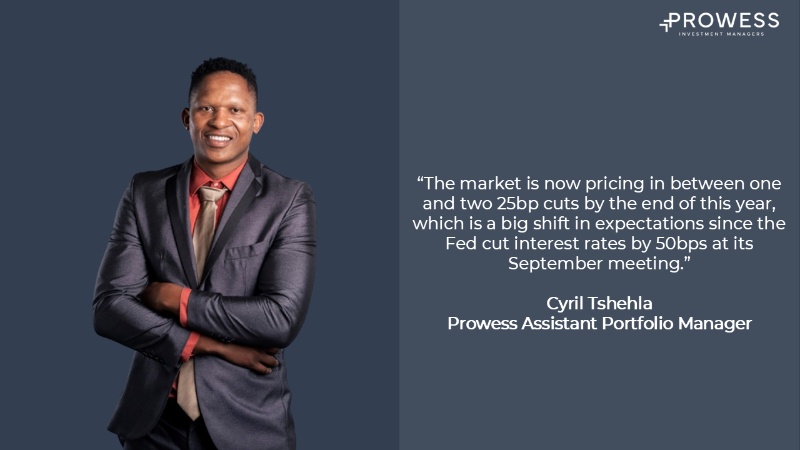The eyes of the market are now firmly fixed on next week’s US election, which remains too close to call. Locally, the Governor Lesetja Kganyago reiterated his call for a lower inflation target.
International Market Developments
The markets are closely following the US elections, which are now just a week away. While the presidential race is expected to be very tight, Donald Trump is perceived to have been building momentum in recent weeks and is now the marginal favourite. Trump has promised to impose 10% tariffs on all imports, and even higher tariffs on those from China. His policies, while potentially supportive to businesses through tax cuts, could also be inflationary, perhaps leading to a less aggressive Fed easing cycle.
The market is now pricing in between one and two 25bp cuts by the end of this year, which is a big shift in expectations since the Fed cut interest rates by 50bps at its September meeting.
The IMF published its World Economic Outlook last week. The report noted that while price pressures persist in some areas the global battle against inflation had ‘largely been won’, and that this had been achieved without a global recession. However, the report also noted that downside risks, predominantly geopolitical, are increasing. Looking forward, the IMF argued for a ‘triple pivot’ as economies emerge from the inflationary cycle, with the current pivot in interest rates being accompanied by a strengthening of fiscal policy to stabilize debt and growth enhancing reforms to promote technology and innovation.
Local Market Developments
Headline inflation fell to 3.8% y/y in September from 4.4% in August, in line with expectations. The decline was primarily driven by fuel inflation, with core and food & non-alcoholic beverages inflation unchanged at 4.1% y/y and 4.7% respectively. The core inflation print was in line with the consensus.
The sharp decline in the petrol price from June, totaling R4.60/l, has been instrumental in the significant decrease in headline CPI inflation. Services inflation remains contained while food price inflation is steady.
Governor Kganyago reiterated his argument that South Africa’s inflation target is out of sync with peers and should be revised lower. He added that the SARB is currently working with the National Treasury to determine what would be an optimal inflation target, but did not say when this will be completed.


